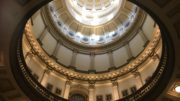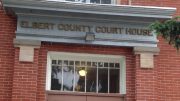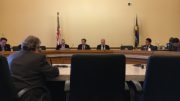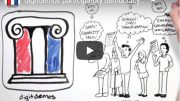Update: On a 65-0 vote, the House passed HB 14-1390 on third reading Monday, April 28. The bill now moves to the Senate for consideration.
Update: The House passed HB 14-1390 on second reading Friday morning with no debate. “This is a very important bill for transparency in local government,” said Rep. Bob Gardner, R-Colorado Springs.
By Jeffrey A. Roberts
CFOIC Executive Director
The House Judiciary Committee moved quickly Thursday evening to advance legislation making it clear that any person has legal standing to challenge violations of Colorado’s Open Meetings Law.
HB 14-1390, which passed unanimously, was introduced in response to a Jefferson County judge’s dismissal of a citizen’s lawsuit that claimed Arvada illegally installed a new City Council member by using secret ballots.
The judge said the council “may have violated” a 2012 law by marking unsigned pieces of paper to eliminate candidates for the vacant council seat. But she ruled in Arvada’s favor because plaintiff Russell Weisfield couldn’t prove he had been personally injured by the hidden votes.
“I have to say, the court’s decision was pretty astounding,” said Rep. Bob Gardner, a sponsor of the bipartisan bill. “The idea that the open-meetings act is only to protect a particular affected individual, and not citizens of the community at large, is kind of incredible to me.”
Gardner, a Colorado Springs Republican, carried HB 12-1169 in 2012 after the Colorado Court of Appeals ruled that the Fort Morgan City Council did not violate the Open Meetings Law when it used anonymous written ballots to appoint two council members and a municipal judge in 2009 and 2010. With only a few exceptions, his bill prohibits the state or any local public body from using secret ballots to adopt “any proposed policy, position, resolution, rule, or regulation” or to take “formal action.”
Gardner told fellow members of the House Judiciary Committee that HB 14-1390 “will confer standing and make clear there is an injury in fact to a citizen who is deprived in seeing the business of their community school board, municipality or special district board not being conducted by open ballots.”
Under the bill, which now heads to the House floor, a person bringing a lawsuit would not have to reside in the jurisdiction accused of violating the Open Meetings Law, also known as Colorado’s Sunshine Law.
Follow the Colorado Freedom of Information Coalition on Twitter @CoFOIC. Like CFOIC’s Facebook page. Do you appreciate the information and resources provided by CFOIC? Please consider making a tax-deductible donation.




